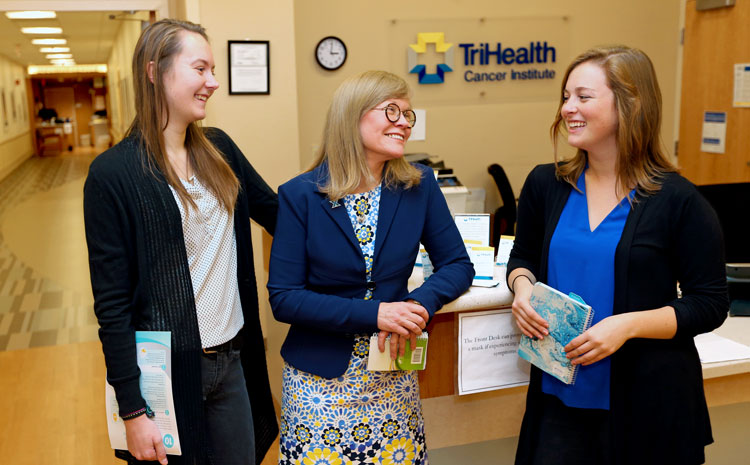
Academic Partnerships: Saving Lives with Genetic Testing
Nov 7, 2018
By France Griggs Sloat
Professor Eileen Alexander believes that to learn how to manage a large project, you have to go out and manage a large project. This semester, Christina Driskell and Julia Schlich, seniors in her Quality Management and Performance Improvement class, are doing just that.
Assigned to the TriHealth Cancer Institute’s cancer genomic database project, the students are applying their classroom skills to real clinical data. Under the supervision of Karen Huelsman, a licensed genetic counselor and coordinator of the institute’s tumor testing project, the students helped build and now manage a tracking system to identify tumors with potentially inherited mutations, which can have important implications for patients’ families.
A bonus for the students has been learning how their work helps families.
“It has been very rewarding knowing how my work affects patients,” Christina says. “I have always been interested in going into health care and through work with Xavier and other organizations, I have learned that helping patients is not limited to clinical care. Data projects like this are the start to a larger aspect of shared information regarding population and public health.”
The TriHealth Cancer Institute is one of several community partners where Alexander’s students can gain project management experience while also providing a community service at the same time. The TriHealth Academic Innovations partnership with Xavier promises to add to and expand such opportunities to benefit even more students.
Based at the institute’s Good Samaritan Hospital location, one of several in Cincinnati, the students help the counselors evaluate tumor test reports from cancer patients for gene mutations that could be inherited, such as the BRCA gene that puts women at higher risk for breast and other cancers. Once the genes are flagged in a patient’s test, the counselors can inform that patient’s family of their risk for cancer, so the clinical team can get them started on a risk reduction plan, Huelsman says.
“In some cases, the students’ work can even be life-saving,” she says.
In one case, the students identified a gene mutation in the tumor of a woman with lung cancer who was entering Hospice care. The information was shared with the family members, and further testing found that her son and granddaughter had also inherited the gene. The granddaughter is now being screened and, at age 25, will be on a care management plan aimed at catching any signs of cancer early and treating it.
“They never knew anything was in that family, but the daughter found six cases of breast cancer on her side of the family,” Huelsman says. “It all started with that tumor. Now the granddaughter has a chance to get ahead of her cancer risk with screening, but she would not have had the opportunity to do that if the Xavier students hadn’t developed an efficient way to screen the clinical data.”
The students are working on other projects at the institute, including one involving screening endometrial cancers and another to evaluate the incidence of genetic testing among cancer patients.
“The students at Xavier are hungry for projects and possess skills in data analysis, query and presentation, but they don't have immediate access to interesting clinical data,” Huelsman says. “So we have a lovely symbiosis that benefits both parties.”
FEATURE IMAGE: Professor Eileen Alexander, center, discusses the tumor testing project with students Christina, left, and Julia.